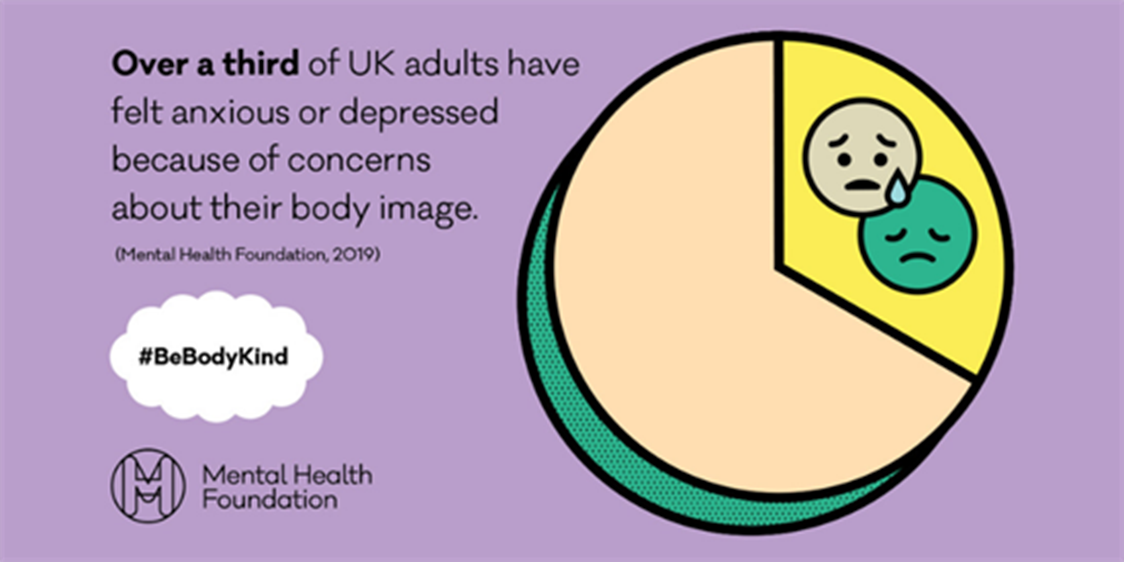It’s Mental Health Awareness Week, a campaign which highlights the importance of looking after our mental health and spreads awareness of a variety of mental health conditions.
This year’s theme is body image and how many aspects of our society can cause us to feel low or distressed about our bodies.

To find out more about the Mental Health Foundation’s Be Body Kind campaign, click here.
Although the theme changes each year, the main focus of campaign remains the same: to encourage discussions about mental health and remove the stigma faced by those who experience mental illness.
In support of this, we’ve created a short guide on how to start a conversation about mental health; whether you need to talk about your own mental health, or want to support someone who’s struggling, these tips can help you to begin a very important conversation:
Advice taken from Mind and the Mental Health Foundation.
-
I want to help someone talk about their mental health
- Listen: Let them tell you everything they need to, and avoid interrupting them. Many of us find talking about our mental health difficult, so it is very important to feel listened to when we’re ready to share our experiences.
- Be understanding: If you have had similar experiences, let them know: it can make a huge difference to them to know that they aren’t alone. If you cannot relate to what they’re telling you, consider doing some research, so you can gain a better understanding of their problems.
- Take them seriously: Try to avoid saying things like “It’s probably nothing” or “You just need to cheer up” as these can make them think that you don’t take their feelings seriously.
- Let them know they can talk to you again: If you are able to, let them know that you are there for them and they can reach out to you on difficult days.
- But be clear on your limits: If you have tried to help someone with their mental health, but think they need professional support, there is no shame in accepting that you can’t provide the help that they need. You can still be supportive by offering to go to the GP or to a local support group with them.
If someone you know is in crisis and needs help urgently, call Samaritans on 116 123.
-
I want to talk about my mental health
- Decide who to speak to: This may seem obvious, but it is important to think about who you want to have this conversation with. Speaking to someone who we trust and feel comfortable with is key. If you are struggling to find someone to speak to, consider calling a mental health helpline.
- Awkwardness is only natural:For many of us, talking about our thoughts and feelings can feel uncomfortable. Just remember to take your time.
- Help them understand (if you’re comfortable with it):The person you’re talking to may have had a similar experience, and be able to relate to how you’re feeling. If they have not experienced what you have, and want to get a better idea of how you’re feeling, they may ask questions such as “how long have you felt like this?” or “did something happen, recently?”. Remember, if these questions feel intrusive or make you uncomfortable, you don’t have to answer them.
- Don’t be discouraged:It can be disheartening if someone replies with statements like “you’ll feel better tomorrow” or “you worry too much”. This comes from a lack of understanding about mental health. You could try sharing advice like this with the person you choose to speak to, to help frame your conversation with them in a constructive way. Alternatively, consider talking to someone different, or calling a helpline.
- Be open to their advice: A friend or family member may suggest getting professional help because they have your best interests at heart. If you feel anxious at the thought of seeing your GP or going to a support group, ask your friend or family member to go with you; it’s very likely that they’d be happy to support you.
One in four of us struggle with our mental health during our lives. Remembering this, and talking about our worries, is the first step towards better health and well-being. This Mental Health Awareness Week, consider taking the opportunity to talk about your mental health.
Southway's Support
If you are struggling with your mental health due to issues such as your rent, debt, employment or benefits, please do not hesitate to contact us on 0161 448 4200; our Advice Team will be happy to help.
If you feel you need help in improving your wellbeing, our Be Well service may be able to assist. Click here to learn more.
We also run a number of community events and volunteer groups, which are a brilliant opportunity to stay active, meet like-minded people, and tackle isolation. To find out about how to get involved, click here.
For more information on mental health, and where to find help, consider visiting the following websites:
Mind https://www.mind.org.uk/
Time to Change https://www.time-to-change.org.uk/
NHS England https://www.england.nhs.uk/mental-health/
Mental Health Foundation https://www.mentalhealth.org.uk/
Samaritans https://www.samaritans.org/

